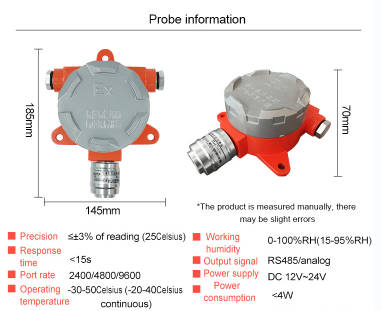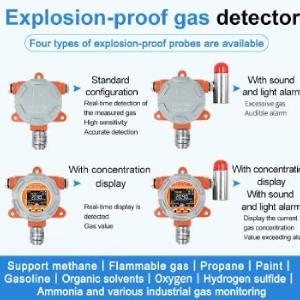Understand gas alarms
Gas alarm , also known as gas detectors or gas sensors, are safety devices that detect potentially harmful gases in commercial and industrial environments. These alarms play a crucial role in ensuring the safety of occupants and workers by providing early warning of gas leaks, toxic gas exposure, and the risk of fire or explosion. In this article, we will explore the significance of gas alarms, their functionality, and the vital role they play in preventing gas-related incidents and protecting lives and property.

Gas alarm are detect a variety of gases, including methane, propane, natural gas and other combustible gases. These devices utilize a variety of sensing technologies. Including electrochemical sensors, catalytic head sensors, infrared sensors and semiconductor sensors to detect the concentration of gases in the air.
By continuously monitoring the environment for the presence of hazardous gases, gas alarms provide early warning of potential gas leaks or toxic gas exposure, allowing occupants to evacuate safely and take appropriate measures to mitigate the risk of fire, explosion, or health hazards.
Primary functions of gas alarms
One of the main functions of a gas alarm is to provide early warning of a gas leak, which can pose a significant risk of explosion in the environment. A gas leak in an industrial gas system can cause a buildup of combustible gases in a confined space, resulting in a catastrophic accident. Equipped with a gas alarm can alert occupants to the presence of a gas leak and immediately evacuate and intervene to prevent potential hazards.

In addition, gas alarms protect people from the threat of toxic gases, especially in environments where heating systems are common. Carbon monoxide is a colorless, odorless gas that is a major health hazard because prolonged exposure can lead to carbon monoxide poisoning. A CO gas alarm is essential to detect toxic gases and provide early warning. As a result, people were able to evacuate in time and seek medical attention.
In addition to their role in providing early warning of gas leaks and toxic gas exposure, gas alarms contribute to the implementation of proactive measures to prevent gas-related incidents and ensure the safety of occupants and workers. By continuously monitoring the environment for the presence of hazardous gases, these alarms enable building managers, facility operators, and homeowners to identify potential sources of gas leaks, malfunctioning gas appliances, or inadequate ventilation systems, allowing for prompt intervention to address the root causes of gas-related risks and prevent future incidents.

In addition, gas alarms help to promote safety awareness in the environment. By installing gas alarms in accordance with safety regulations and best practices, people can detect gas-related risks early and take proactive action. In addition, the gas alarm can be an obvious reminder of the importance of gas safety, regular inspection of gas systems, and compliance with safety procedures.
Gas alarms are indispensable safety devices
In short, the gas alarm is an indispensable safety device in preventing gas-related accidents. It plays a key role in ensuring the safety of its occupants. With warnings of gas leaks and early detection, the alarm can be quickly evacuated to mitigate potential hazards. The active safety measures of gas alarms help create a safer environment and ultimately protect life and property.
